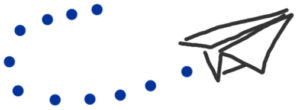I re-watched Tim Brown’s Tales of Creativity & Play this morning, and the part with the Finger Blaster had me wanting to incorporate something similar into the YCISL workshops. I also had just watched a TED video “How To Make Applying For Jobs Less Painful” by Priyanka Jain in which she showed a clapping test to reveal a thinking trait. This has me again wanting to demonstrate the spectrum of approaches any given group naturally takes to tackle a problem (and how education, let’s say a typical classroom, is herded to take just one approach). So here is an idea for a workshop exercise using paper to make paper airplanes.

I am assuming that for any given group that paper airplane-making skills are widely spread. Some may already know how to make a paper airplane. A few may know how to make sophisticated ones that fly far or can do acrobatics. Most will likely know how to make the simple paper airplane that fly a relatively short distance compared to the current record of 220′ 10″!
For this exercise, we provide one sheet of paper to each participant. They start by writing their name on the paper for post-flight identification. The participants are then simply instructed to build a paper airplane with their sheet of paper and we will see whose flies the farthest. No other instructions.
They will be given 10 minutes to do this. After that, it will be time to fly their creations.
I hope to observe a wide range of approaches to this task such as:
- folding using their existing knowledge about paper airplanes, if any
- doing some independent research such as checking the WWW
- asking someone for help or advice
- just watching someone else and copying
- forming a collaboration and working together
Then we fly and see whose flies the farthest. Just as we do with the Spaghetti Tower Marshmallow exercise, we could do multiple rounds of this and look for learning through iteration. Will they change folding technique or will they take a different approach?
Each of the approaches reveals how one’s mindset is currently geared to problem-solving. The three main lessons (phrased as questions) are:
- Does your leadership worldview include other people (collaborator, advisor, teacher, etc)?
- Do you have a trusted growth mindset that takes you out of your comfort zone? Or do you tend to play it safe?
- Are you comfortable learning more about yourself (self-awareness) and how you approach problem-solving (self-management)? Are there any issues that can be addressed?
